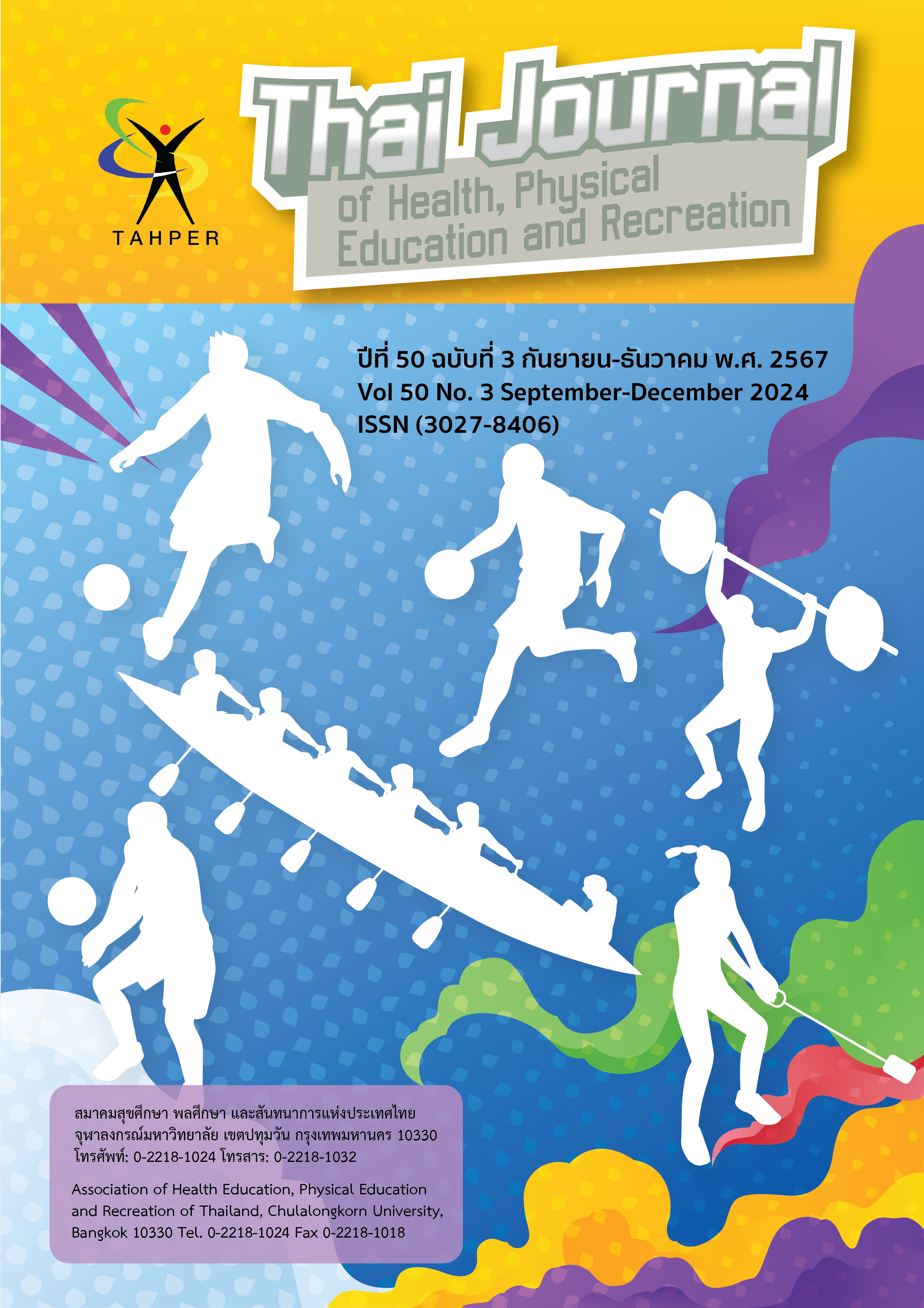The Development of Online Training Process Using Symposium Discussion Techniques for Supporting Understanding of the game of Jujitsu
Main Article Content
Abstract
The purposes of this research were: 1) to develop online training process using symposium discussion techniques for supporting understanding of the game of jujitsu quality, 2) to compare the learning achievement of the online training process using symposium discussion techniques for supporting understanding of the game of jujitsu with a criteria of 70 percent, and 3) to study the satisfaction of the trainees toward the online training process using symposium discussion techniques for supporting understanding of the game of jujitsu. The sample were students at the Ubon Ratchathani University Jujitsu Club in Academic Year 1/2565, which is a new member of the club received from recruiting. The totaling were 34 people, which obtained by using purposive sampling method. The research instruments were consisted of 1) the online training process using symposium discussion techniques for supporting understanding of the game of jujitsu, 2) an achievement test on the topic of the game of jujitsu, and 3) the satisfaction survey of the trainees toward the online training process using symposium discussion techniques for supporting understanding of the game of jujitsu. The statistics used in the study were mean, standard deviation, and the One Sample t-test.
The results of this the study on the online training process using symposium discussion techniques for supporting understanding of the game of jujitsu were 8 procedures as follows: 1.1) setting training objectives, 1.2) analyzed training participants, 1.3) course content design, 1.4) setting online training activities through the internet network, 1.5) preparing the training environment on the internet, 1.6) participants orientation, 1.7) training and 1.8) evaluation. The experts assessed the overall suitability was at the most appropriate level ( = 4.55, S.D. = 0.52). 2) The learning achievement test after being trained by the online training process using result symposium discussion techniques, was met the criterion of 70 percent, p < 0.05). 3) The overall scores of satisfactions of the trainees toward the online training process using symposium discussion techniques were at the highest level ( = 4.74, S.D. = 0.46).
Article Details

This work is licensed under a Creative Commons Attribution-NonCommercial-NoDerivatives 4.0 International License.
Critical thinking in journals is the right of the author. The Association of Health Education, Physical Education and Recreation of Thailand is not always required, to create diversity in ideas and creativity.
ความคิด ข้อวิพากษ์ในวารสารเป้นสิทธิของผู้เขียน สมาคมสุขศึกษา พลศึกษา และสันทนาการแห่งประเทศไทยไม่จำเป็นต้องเห็นชอบด้วยเสมอไป เพื่อให้เกิดความหลากหลายในความคิดและความสร้างสรรค์
References
กฤษณะ บุญประสิทธิ์. (2560). การพัฒนากลยุทธ์เพื่อส่งเสริมนักกีฬายูยิตสูไทยสู่ความเป็นเลิศ. (วิทยานิพนธ์ปริญญาปรัชาดุษฏีบัณฑิต). มหาวิทยาลัยบูรพา.
ชัยยงค์ พรหมวงศ์. (2550). การพัฒนาหลักสูตรและสื่อการเรียนการสอน: สื่ออเล็กทรอนิกส์เพื่อการศึกษา. นนทบุรี: มหาวิทยาลัยสุโขทัยธรรมาธิราช.
บุญชม ศรีสะอาด. (2560). การวิจัยเบื้องต้น ฉบับปรับปรุงใหม่. (พิมพ์ครั้งที่ 10). กรุงเทพฯ: สุวีริยาสาส์น.
ทิวารัตน์ ประเสริฐสังข์. (2559). การพัฒนารูปแบบการเรียนรู้ร่วมกันบนเว็บด้วยกระบวนการจัดการความรู้เพื่อเสริมสร้างสมรรถนะของนักศึกษาวิชาชีพครู. (ปริญญาปรัชญาดุษฎีบัณฑิต สาขาวิชาเทคโนโลยีและสื่อสารการศึกษา ภาควิชาเทคโนโลยีการศึกษา). มหาวิทยาลัยเกษตรศาสตร์.
ธนทรัพย์ โกกอง. (2562). การพัฒนาชุดฝึกอบรมออนไลน์เพื่อเตรียมความพร้อมก่อนการฝึกปฏิบัติงานสำหรับนิสิตสาขาวิชาสารสนเทศศึกษา มหาวิทยาลัยบูรพา (วิทยานิพนธ์ปริญญาการศึกษามหาบัณฑิต). มหาวิทยาลัยบูรพา.
พัลลภ สุวรรณฤกษ์. (2563). การพัฒนาการฝึกอบรมออนไลน์แบบสอนงานเพื่อส่งเสริมความสามารถในการออกแบบการสอนออนไลน์กรณีศึกษานักศึกษาระดับบัณฑิตศึกษา มหาวิทยาลัยศิลปากร. (วิทยานิพนธ์ปริญญามหาบัณฑิต). มหาวิทยาลัยศิลปากร.
ไพศาล วรคํา. (2564). การวิจัยทางการศึกษา. (พิมพ์ครั้งที่ 12). มหาสารคาม: ตักสิลาการพิมพ์.
ยงยุทธ เกษสาคร. (2551). เทคนิคการฝึกอบรมและการประชุม. (พิมพ์ครั้งที่ 6). กรุงเทพฯ: ไทยพัฒนารายวันการพิมพ์.
วิจิตร อาวะกุล. (2540). การฝึกอบรม. (พิมพ์ครั้งที่ 2). กรุงเทพฯ: ศูนย์หนังสือจุฬาลงกรณ์มหาวิทยาลัย.
ศุภวรรณ วงศ์สร้างทรัพย์ และคณะ. (2564). การพัฒนาการเรียนการสอนโดยใช้ Google Classroom ในรายวิชากิจกรรมพลศึกษา สำหรับนิสิตมหาวิทยาลัยเกษตรศาสตร์ วิทยาเขตกำแพงแสน. วารสารสุขศึกษา พลศึกษา และนันทนาการ. 47(2), 169.
สมคิด บางโม. (2551). เทคนิคการฝึกอบรมและการประชุม. (พิมพ์ครั้งที่ 6). กรุงเทพฯ: วิทยพัฒน์.
สมนึก ภัททิยธนี. (2565). การวัดผลการศึกษา. (พิมพ์ครั้งที่ 13). กาฬสินธุ์: ประสานการพิมพ์.
สมาคมกีฬายูยิตสูแห่งประเทศไทย. (2557). แผนยุทธศาสตร์กีฬายูยิตสู (พ.ศ. 2557-2561) สมาคมกีฬายูยิตสูแห่งประเทศไทย. กรุงเทพฯ : สมาคมกีฬายูยิตสูแห่งประเทศไทย.
สุชาติ เพชรเทียนชัย และคณะ. (2565). การพัฒนาแอปพลิเคชันเพื่อการเรียนรู้ วิชาฟุตบอล สำหรับนักศึกษา มหาวิทยาลัยราชภัฏหมู่บ้านจอมบึง. วารสารสุขศึกษา พลศึกษา และนันทนาการ. 48(2), 16.
Driscoll, Margaret. (1998). Web-Based Tranining. San Francisco: Jossey-Bass Tranining Pfeiffer.
Jokela, P., & Karlsudd, P. (2017). Learning with Security. Journal of InformationTechnology education: Research, 6, 291-309.
Kavathatzopoulos, I. (2003). The use of information and communication technology in the training for ethical competence in business. Journal of Business Ethics, 48(1), 43-51.
Smithikai, C. (2013). Personnel training in the organization (8th ed.). Bangkok: Chulalongkorn University. (in Thai).


